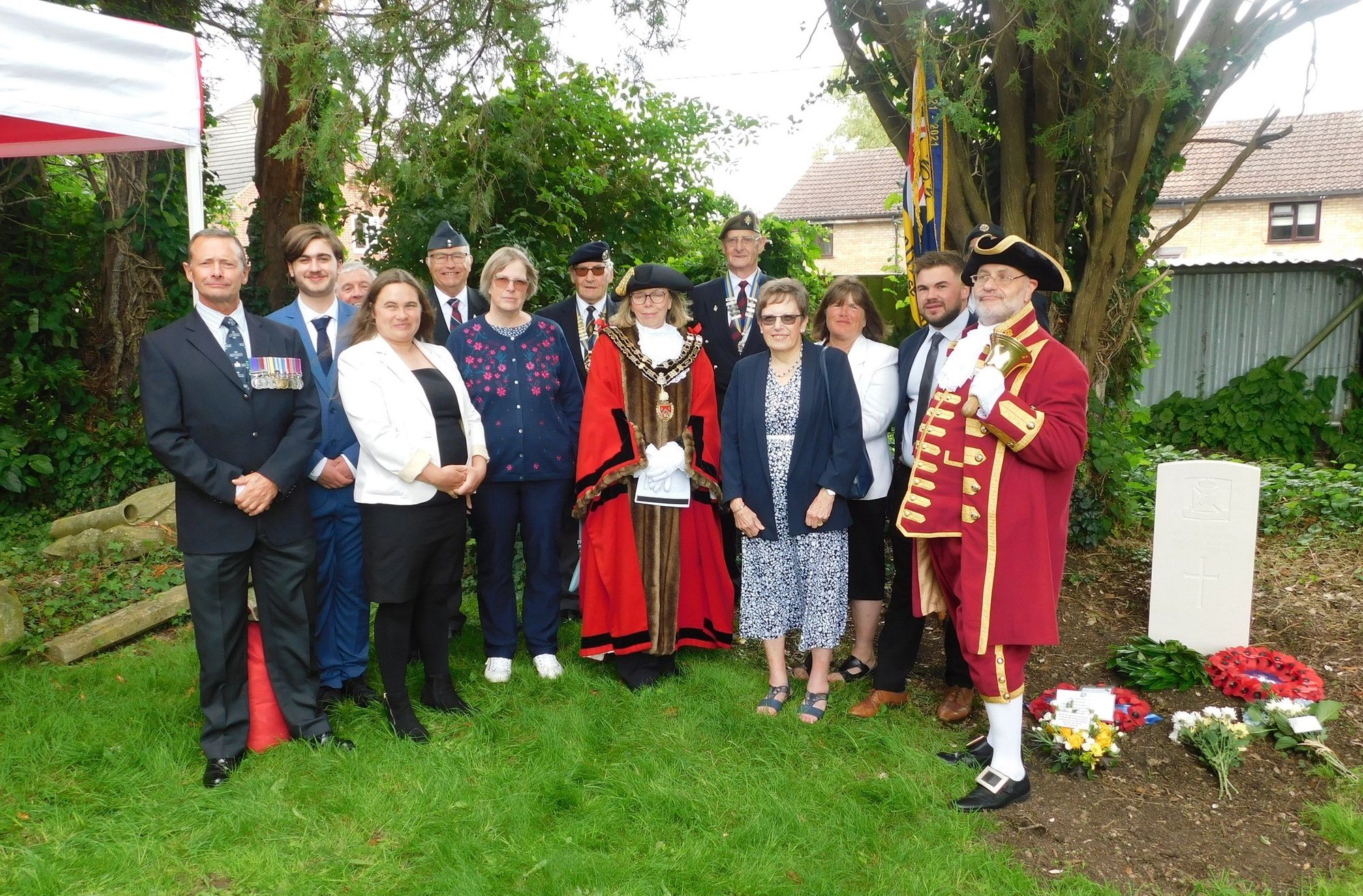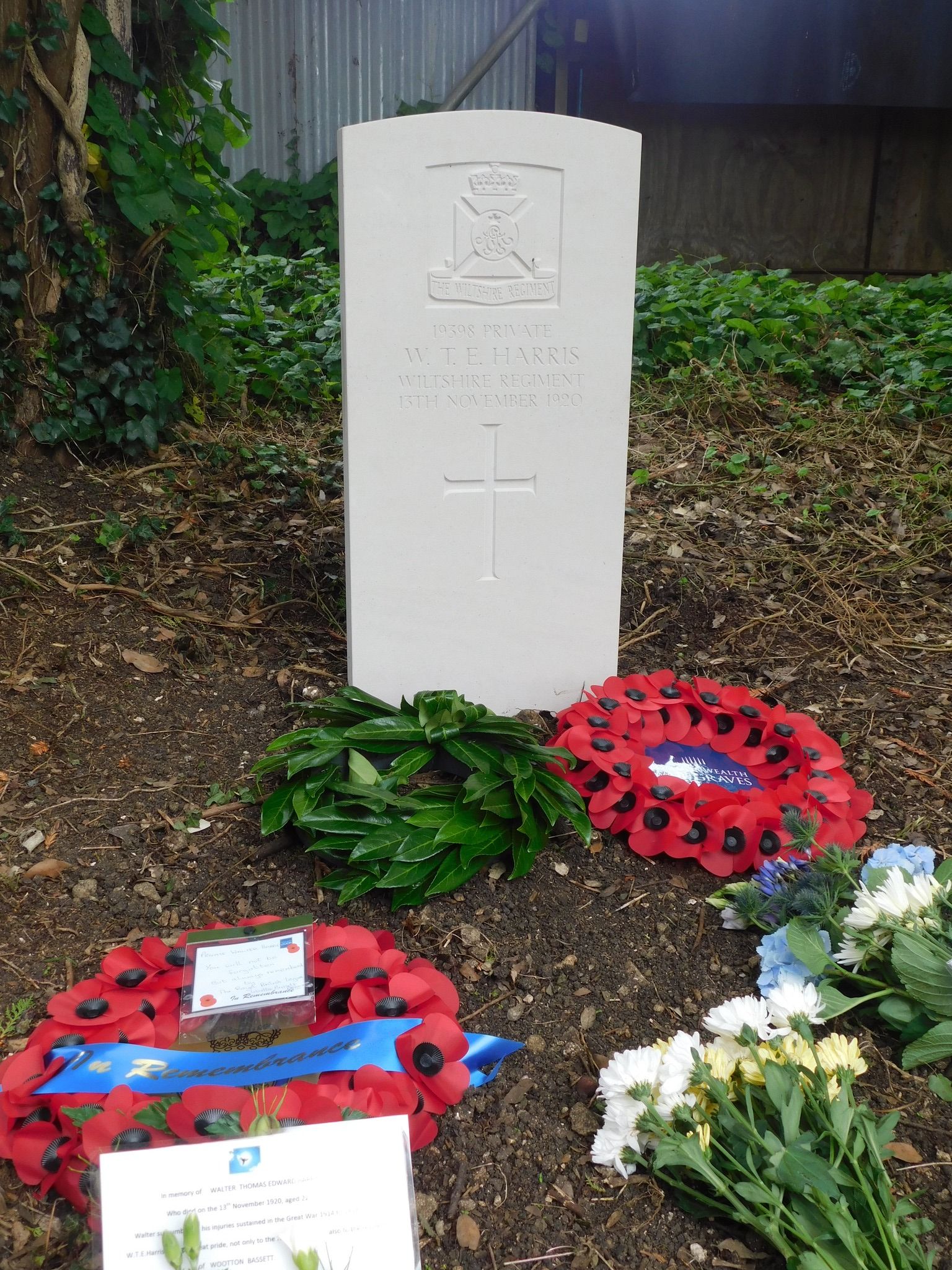Private Walter Thomas Ewart Harris, in from the cold
I uncovered Walter's story as part of my research into Wootton Bassett's WW1 history, and I am immensely proud that he now has the recognition he deserves.

There are many men and women missing from the official Commonwealth War Graves Commission (CWGC) list of casualties from the First and Second World Wars. Researchers like myself aim to correct any mistakes and significantly, to give individuals the official recognition they deserve, through a listing on the CWGC registers and an official headstone that will survive and be cared for by the Commonwealth War Graves Commission. This process is known as 'bringing a soldier in from the cold'. You can find out about a large project which does this kind of work here: https://www.infromthecold.org. Many of these deaths were caused by, or exacerbated by, service, but occured after the individuals were discharged. As a result, they did not appear on official records. Walter Harris was one of these men.
I uncovered Walter's story as part of my research into Wootton Bassett's WW1 history, and I am immensely proud that he now has the recognition he deserves. I first wrote to the Commonwealth War Graves Commission about Walter in 2013, to request that Private Harris be brought “in from the cold” and given a CWGC headstone. I provided the necessary evidence to support the request, the case was eventually approved, and he is now officially commemorated by the CWGC.
At 11am on 21st August 2023 I attended a memorial service to dedicate Walter's new headstone in Royal Wootton Bassett Cemetery. The service was conducted bby Reverend Katey Minshall, and was attended by members of the Royal Wootton Bassett Branch of Royal British Legion, the Mayor, Owen Collier the Town Crier, family members of Private Harris, a representative from the CWGC, the Town Clerk, several Councillors, members of the Council's Cemetery team and several local residents. We laid wreaths and flowers, and a one minute silence was held. Matthew Walton, (MD of my son's previous brass band, Brunel Academy), played the Last Post and the Reveille.


Walter Thomas Ewart Harris was born on 29th July 1898 at 22 Turner Street in Swindon. Walter’s father was Edward Harris, a sawmill labourer working for the Great Western Railway, who was born in Wootton Bassett in about 1870. In 1893 he married Charlotte née Matthews, who had an illegitimate son Frederick Jacob Matthews. Walter's parents Edward and Charlotte had six children together, Martha, who died in 1905 aged 13, Francis Edward, William John, Walter, James Albert, born in 1901, and Dorothy Margaret, born in 1906. In 1901 the family were living in Sparrow Lane and by 1911 they had moved to Coxstalls. Charlotte’s son Frederick was a groom, and a member of the YMCA. He died at Coxstalls in 1912, aged 23, after three years of illness. Later the family moved to 46 High Street. This house was owned by W J Comley in 1914, (probably William James Comley from number 124). Edward and Charlotte were listed at 46 High Street in the 1918 electoral roll, when three of their sons, Francis, William, and Walter, were absent military voters. Edward died at 46 High Street in 1927.
Walter enlisted on 7th Apr 1915 and was immediately posted to the 7th (Service) Battalion of the Wiltshire Regiment as a Private (19398). He went out to France on 22nd Sep 1915. He was transferred to Salonika later that year and remained there for nearly three years. He was listed as an absent military voter at 46 High Street in the 1918 electoral roll and did not come home for his first leave until Aug 1918. One can hardly imagine how transformed he must have been by his experiences.
After his leave Walter was sent back to France where the 7th Battalion were attached to 150th Brigade in 50th (Northumbrian) Division. The 7th Battalion marched to Le Cateau, where they were billeted on the night of 29th Oct 1918. On the following afternoon, 30th Oct 1918, the Battalion relieved the 9th Devon Regiment in the line, where Walter and his brother William were wounded, both on the same day.
Unfortunately Walter's service record has not susrived, and although the War Diary for the 7th Wiltshires contains detailed lists of its wounded, missing, and casualties, before and after this period, there is a gap in the records from to 19th October to 3rd November 1918. It is impossible to find out more about Walter's wounds. On 9th November the Brigadier General George Rollo wrote to the Officer Commanding the 7th Wiltshires about this period:
"The Brigadier General Commanding wishes to congratulate all ranks on the magnificent work they have performed during the last six weeks. They have fought successfully without exception, the Brigade never having failed to carry out the task set it, undergoing on many occasions great hardships, and without ever the slightest complaint. The Brigadier has hoped that the Brigade would have been allowed to still closely follow the Bosche, whom it has so often defeated. However, the Brigade has the satisfaction of knowing that it has advanced further than any other Allied Soldiers and has driven the Bosche out of Northern France on its front."
Walter was badly wounded in the head and was brought back to England and treated in hospital in Nottingham. He was discharged from the army, no longer physically fit for service, on 27th Jan 1919.
Walter was awarded the British War Medal, the Victory Medal and the 1914-1915 Star.
Walter remained in hospital until Feb 1919, by which time he had sufficiently recovered to be sent home to Wiltshire. He spent the next few months training as a poultry farmer in Chiseldon, under the care of the Swindon Training Centre for Disabled Ex-Service Men. He married Gladys May Norris, of 169 High Street, on 6th September 1919, but his happiness was short lived.
On 13th Oct 1920 he took a turn for the worse and returned home from Chiseldon. A week later he was taken to Ward 7 of the Royal United Hospital in Bath, then known as the Bath War Pensions Hospital, where he underwent four operations. Everything possible was done for him, but he passed away early in the morning of Saturday 13th Nov 1920. Walter’s body was brought home from Bath on the following Wednesday morning, and the funeral took place in the afternoon. The coffin was of polished elm with brass furniture, and a plate engraved with the inscription: “WALTER T HARRIS Died Nov 13th 1920, Aged 22 years.”
The coffin was covered with a Union Jack, and Walter’s helmet and belt were placed upon it. The cortège was met by a firing party at the headquarters of the Discharged Sailors’ and Soldiers’ Federation in Wootton Bassett. The procession moved slowly along the High Street, led by the band of the Wilts Depot at Devizes playing Chopin’s March Funèbre, and followed by over a hundred discharged soldiers and sailors, members of the parish council, and members of the town football club. It must have been an impressive and sombre sight.
The first part of the burial service was read in the parish church by Reverend Cowie. The church was crowded, and some of the shops were closed during the hour of the service. The Vicar, Reverend Mathias, read the lesson. The cortège then proceeded to Wootton Bassett Cemetery, where Walter was laid to rest with his grandfather, Jacob Matthews. The grave was beautifully lined with laurel leaves and laurestina by Joseph Wiltshire as a token of his personal respect and esteem, and tributes included wreaths and flowers from several old friends including Mervyn Edmonds, who had served in the Canadian Army, and Henry Charles Woodward, also of the 7th Wiltshire Regiment. As Reverend Cowie concluded the service, the firing party fired three volleys, and the Last Post was sounded.
The Bath Chronicle and Weekly Gazette reported:
Sad reminders of the war are constantly cropping up. Among the deaths officially reported to the Health Committee on Monday the Medical Officer of Health for the city under the heading “violent” was a case of gunshot wound the head. On making inquiries I find this record related to a poor fellow who died at the Pensions Hospital, Combe Park — ex-Private Walter Harris, aged 22, Wootton Bassett. He seemed to have recovered from his wound, but septic enciphalitis set in, and from this he succumbed. Enciphalitis, I believe, is the medical description of inflammation of brain tissue.
Bath Chronicle and Weekly Gazette – Saturday 25 December 1920
Gladys remarried to Percy Warner in 1927. In the 1939 Register (census) she was listed with her mother in Vale View, and at that time Percy was not with her. Gladys died in 1977 and was buried at Wootton Bassett cemetery on 6th January 1977, grave space 147 (register number 3458). Percy was not buried locally.
For 102 years Private Walter Thomas Harris’s grave remained unmarked, although he was remembered on the brass memorial tablet in St Bartholomew’s Church, on the paper Roll of Honour in the Church, and on the relatively recent Wootton Bassett war memorial. On all three, however, he is listed incorrectly as Walter Thomas Hewer Harris or Walter T H Harris. Both his birth and death registrations confirm that his middle name is Ewart, not Hewer.
Walter’s brother Francis Edward Harris
Francis was born in 1894, the eldest of the brothers. He was a draper’s shop assistant doing outside work, which probably included measuring and estimating, or perhaps delivering and installing soft furnishings. He was listed as an absent military voter at 46 High Street in the 1918 electoral roll, but I have not been able to confirm his service record.
Walter’s brother William John Harris
William was born in 1896 and was working as a farm labourer in 1911. He joined up on the same day as his brother, Walter, and served with him as a Private in the 7th Wiltshires (12277). He went out to France the day before Walter, on 21st Sep 1915. He was listed as an absent military voter at 46 High Street in the 1918 electoral roll. On the afternoon of 30th Oct 1918, the Battalion relieved the 9th Devon Regiment in the line, and it was probably here that William and his brother Walter were wounded, both on the same day, just two weeks before the Armistice. William was taken to a hospital in Yorkshire but was later transferred to the Royal United Hospital in Bath, then known as the Bath War Pensions Hospital, for surgery on his temple. He was discharged from the Army on 28th Feb 1919. Just like Walter, he was awarded the British War Medal, the Victory Medal and the 1914-1915 Star. He married Rose Emily Lawrence from the Curriers Arms on 15th April 1922.
